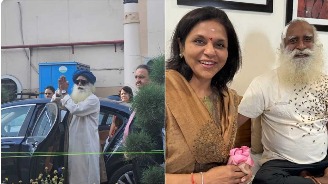Blog Detail

Brain surgery can be a life-changing experience, and the road to recovery requires dedication and patience. Experts offer insights on what to expect during this crucial time.
On Wednesday, spiritual leader Sadhguru Jaggi Vasudev was seen getting discharged from the Indraprastha Apollo Hospital in New Delhi, after getting hospitalised for a serious brain bleed last week.
Sangita Reddy, joint managing director of the Apollo Hospitals group, had met with him on Tuesday. Reddy shared her visit on X, previously Twitter, which said, “It was heartwarming to see Sadhguru guruji sitting up and in good spirits. Wishing him a speedy recovery and continued good health.”
Brain surgery can be a life-changing experience, and the road to recovery requires dedication and patience. Experts offer insights on what to expect during this crucial time.
The Length of Your Journey
Recovery is a unique path for each patient. The type of surgery, your age, and overall health significantly impact the timeline. While hospital stays typically range from a few days to a week, a complete recovery at home can take anywhere from 6 to 12 weeks.
Dr Mohan Krishna Narasimha Kumar Jonnalagadda, consultant neurologist, Yashoda Hospitals Hyderabad, said one must be careful after brain surgery to avoid falls at home and hospital.
“Symptoms like pain at surgery site, dizziness, persistent headache should be reported immediately. Management of comorbidities like diabetes, hypertension, chronic kidney disease, coronary artery disease should be managed appropriately with multidisciplinary team,” he told indianexpress.com in an interaction.
While initial discomfort, fatigue, and cognitive challenges are to be expected, Dr Ashok Hande, consultant-neuro & spine surgery, Fortis Hiranandani Hospital, Vashi, advised physical and occupational therapy as they help the patient regain strength, mobility, and independence.
Fueling Your Recovery: Dietary Do’s and Don’ts
Dr Anand Katkar, a neurosurgeon consultant at Ruby Hall Clinic Pune emphasised the importance of a balanced and nutritious diet to support healing:
Prioritise Nutrient-Rich Foods: Fill your plate with fruits, vegetables, whole grains, lean proteins, and healthy fats. These provide essential building blocks for tissue repair and overall well-being.
Stay Hydrated: Consistent water intake is crucial for your body’s recovery processes.
Protein Power: Protein is essential for muscle strength and tissue repair. Include lean protein sources like poultry, fish, beans, lentils, tofu, and low-fat dairy products in your meals.
Embrace Healthy Fats: Avocados, nuts, seeds, and olive oil are rich in healthy fats that benefit brain health and reduce inflammation.
Limit Processed Foods and Sugars: These offer minimal nutritional value and can hinder recovery by contributing to inflammation and energy fluctuations.
Balanced Meals are Key: Aim for balanced meals that combine carbohydrates, protein, and healthy fats for sustained energy and optimal recovery.
Smaller, More Frequent Meals: Smaller, frequent meals might be easier to tolerate than large ones, especially if you experience appetite changes or nausea.
Moving Your Body – Exercise and Activity
Dr Abhidha Shah, a senior consultant neurosurgeon at Apollo Hospital Navi Mumbai, stressed the importance of listening to your body when it comes to exercise:
Follow Your Doctor’s Guidance: Always prioritise your healthcare team’s recommendations regarding exercise after brain surgery.
Start Slow: Begin with gentle activities like walking and light stretches as prescribed by your doctor. Gradually increase the intensity and duration of your exercise routine as you feel stronger.
Listen to Your Body: Pay attention to how your body responds to exercise. If you experience headaches, fatigue, dizziness, or any other concerning symptoms, reduce the intensity and consult your doctor.
Avoid Strenuous Activities Initially: In the early stages of recovery, avoid activities with heavy lifting, straining, or a risk of falling or injury.
Prioritise Rest: Ensure you get adequate sleep and prioritise rest to support healing and recovery.
According to Dr Ravi Suman Reddy, consultant neuro & spine surgeon, Yashoda Hospitals Hyderabad, mental health support may also be beneficial, as recovery can be physically and emotionally challenging. Additionally, having a strong support system of family and friends can help ease the transition back to daily life.
Remember, recovery is a marathon, not a sprint. Be patient with yourself, prioritise your well-being, and don’t hesitate to reach out to your healthcare team for guidance throughout the process.

01 Reviews
Jockon Dom
10 months agoCupcake ipsum dolor sit amet. Dragée sweet roll tiramisuet croissant lollipop candy.